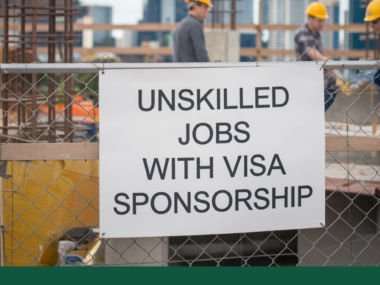Canada has long been recognized as a land of opportunity, drawing immigrants from across the globe seeking better economic prospects and a higher quality of life. Among the myriad of employment opportunities, unskilled jobs offer a viable pathway for many newcomers, particularly those who may not possess advanced degrees or specialized skills. These positions, often in sectors like agriculture, hospitality, construction, and manufacturing, are essential to the Canadian economy and can provide a stepping stone for individuals aiming to establish themselves in the country.
Visa sponsorship plays a critical role in facilitating the entry of foreign workers into Canada. Understanding the landscape of unskilled jobs that offer visa sponsorship not only aids prospective immigrants in their job search but also helps them navigate the complex immigration system.
This article will delve into the types of unskilled jobs available, the visa options for foreign workers, the application processes, and the potential pathways to permanent residency. Additionally, we’ll address frequently asked questions to clarify common concerns related to working in Canada as a foreign national.
Understanding Unskilled Jobs
Definition of Unskilled Jobs
Unskilled jobs typically refer to positions that do not require specialized training or formal education beyond a high school diploma. These roles often involve manual labor, repetitive tasks, or service-oriented functions. While they may be labeled “unskilled,” many of these jobs demand strong work ethics, reliability, and the ability to work effectively in a team environment.
Common Sectors for Unskilled Jobs
- Agriculture: Seasonal work in farming, crop harvesting, and livestock care.
- Hospitality: Roles such as hotel staff, restaurant workers, and cleaners.
- Construction: Positions for laborers, helpers, and trades assistants.
- Manufacturing: Factory workers, assembly line roles, and machine operators.
- Retail: Cashiers, stock clerks, and sales associates.
Why Unskilled Jobs Matter
Unskilled jobs play a vital role in supporting Canada’s economy. They fill essential gaps in various industries, particularly during peak seasons, and contribute to the overall functionality of everyday services. Additionally, they often serve as an entry point for immigrants, allowing them to acclimate to the Canadian work environment and pursue further education or training.
Visa Options for Unskilled Workers
Temporary Foreign Worker Program (TFWP)
The TFWP is one of the primary avenues for unskilled workers seeking employment in Canada. This program allows Canadian employers to hire foreign nationals to fill temporary labor shortages.
- Eligibility Requirements:
- A valid job offer from a Canadian employer.
- The employer must obtain a Labour Market Impact Assessment (LMIA), demonstrating the need for a foreign worker.
- The job must meet the requirements for unskilled positions (generally classified under NOC C or D).
- Types of Jobs Under TFWP:
- Agricultural workers
- Food service workers
- General laborers in construction and manufacturing
International Experience Canada (IEC)
The IEC program offers young people from participating countries the chance to work and travel in Canada. It is ideal for those who wish to experience life in Canada while earning money through unskilled jobs.
- Eligibility Requirements:
- Must be between the ages of 18 and 35 (varies by country).
- Must hold a valid passport from a participating country.
- The ability to support oneself during the stay in Canada.
Atlantic Immigration Program (AIP)
The AIP is designed to attract immigrants to Canada’s Atlantic provinces (Newfoundland and Labrador, Nova Scotia, New Brunswick, and Prince Edward Island). This program aims to fill labor shortages in various sectors, including unskilled positions.
- Eligibility Requirements:
- Job offer from a designated employer in one of the Atlantic provinces.
- Meet the minimum language proficiency requirements.
- Have a valid temporary work permit.
Provincial Nominee Program (PNP)
Certain provinces in Canada have established their own nomination programs, allowing them to nominate immigrants who wish to settle in their region. Many of these programs have streams specifically for unskilled workers.
- Eligibility Requirements:
- A job offer from an employer in the province.
- The province must be facing labor shortages in specific sectors.
- Meet the criteria established by the provincial government.
The Application Process
Steps to Obtain Visa Sponsorship
- Research and Identify Opportunities: Begin by exploring job openings in Canada that offer visa sponsorship. Online job boards, company websites, and recruitment agencies can be valuable resources.
- Secure a Job Offer: Apply for jobs and attend interviews. Once a job offer is extended, ensure it is formalized in writing.
- Labour Market Impact Assessment (LMIA): The employer must apply for an LMIA if required. This document verifies that there are no Canadian citizens or permanent residents available to fill the position.
- Apply for the Work Permit: Once the LMIA is approved, the next step is to apply for a work permit through Immigration, Refugees and Citizenship Canada (IRCC). This includes submitting necessary documentation such as proof of job offer, LMIA, and identification.
- Travel to Canada: Upon receiving the work permit, you can make travel arrangements to Canada. Be prepared to present your documentation at the border.
Tips for Success
- Tailor Your Resume: Highlight relevant experience, skills, and your willingness to work in challenging environments.
- Network: Connect with professionals in your field through social media platforms like LinkedIn, which can lead to job referrals.
- Prepare for Interviews: Research common interview questions and practice your responses to demonstrate your suitability for the position.
Recommended articles
- Skilled worker visa jobs in Australia
- High-paying jobs in Australia for immigrants
- Australia healthcare jobs high salary
- Navigating Nursing Jobs in Australia: A Guide for Foreign Professionals
- Unlocking Opportunities: A Comprehensive Guide to Healthcare Jobs in Australia for Foreigners
Life as an Unskilled Worker in Canada
Working Conditions
Unskilled jobs can vary widely in terms of working conditions. Many positions involve physical labor, long hours, and, at times, challenging environments (e.g., outdoor work in inclement weather). However, these jobs often offer competitive wages and opportunities for overtime.
Rights and Protections
Canada has strong labor laws in place to protect workers, including those in unskilled positions. Rights include:
- The right to fair wages.
- Safe working conditions.
- The right to join a union.
- Protection from discrimination.
Pathway to Permanent Residency
Many unskilled workers in Canada may seek to transition to permanent residency. Depending on the visa program under which they arrived, options may include:
- Canadian Experience Class (CEC): For those who have gained at least one year of skilled work experience in Canada.
- Provincial Nominee Program (PNP): Many provinces offer streams that allow workers with job offers to apply for permanent residency.
- Express Entry: Workers may be eligible to enter the Express Entry pool if they gain experience and education that qualifies them under the skilled worker categories.
Challenges Faced by Unskilled Workers
Employment Instability
Many unskilled positions are temporary or seasonal, leading to uncertainty regarding job security. Workers may need to frequently seek new employment opportunities to maintain their status.
Adjustment to a New Culture
Adapting to life in Canada can be challenging for newcomers, particularly in terms of language barriers, cultural differences, and social integration. Building a support network is crucial for overcoming these challenges.
Financial Considerations
Unskilled jobs often offer entry-level wages, which may be insufficient to cover living expenses, especially in larger cities. Proper financial planning and budgeting are essential.
FAQs
1. What types of unskilled jobs are available in Canada?
Common unskilled jobs include positions in agriculture, hospitality, construction, manufacturing, and retail. These roles often do not require specialized training or advanced education.
2. How can I find unskilled jobs with visa sponsorship in Canada?
You can search for job opportunities through online job boards, recruitment agencies, and company websites. Networking with professionals in your field can also be beneficial.
3. What visa options are available for unskilled workers in Canada?
The main visa options include the Temporary Foreign Worker Program (TFWP), International Experience Canada (IEC), Atlantic Immigration Program (AIP), and Provincial Nominee Program (PNP).
4. What is a Labour Market Impact Assessment (LMIA)?
An LMIA is a document that Canadian employers must obtain to hire foreign workers. It demonstrates that there is a need for a foreign worker and that no Canadian citizens or permanent residents are available for the position.
5. Can unskilled workers apply for permanent residency in Canada?
Yes, many unskilled workers can transition to permanent residency through various programs, such as the Canadian Experience Class (CEC) and Provincial Nominee Program (PNP), depending on their work experience and job offers.
6. What rights do unskilled workers have in Canada?
Unskilled workers in Canada have rights to fair wages, safe working conditions, and protection from discrimination. They also have the right to join unions and seek help if they face workplace issues.
7. Are there language requirements for unskilled jobs in Canada?
While many unskilled positions do not require advanced language skills, basic proficiency in English or French can significantly enhance job prospects and facilitate communication in the workplace.
8. What challenges might I face as an unskilled worker in Canada?
Challenges may include employment instability, cultural adjustment, and financial considerations, especially in larger cities where living costs are higher.
Conclusion
Unskilled jobs with visa sponsorship in Canada present a significant opportunity for individuals seeking to start a new life in this vibrant and diverse country. By understanding the various job sectors, visa options, and the application process, potential immigrants can effectively navigate their journey to employment and, ultimately, permanent residency. While challenges exist, the rewards of working in Canada can lead to a fulfilling and prosperous life. Whether you
’re looking to support your family, gain valuable experience, or build a future in Canada, the opportunities are abundant for those willing to work hard and adapt to their new environment.










